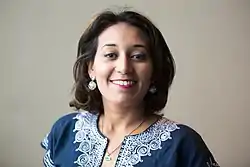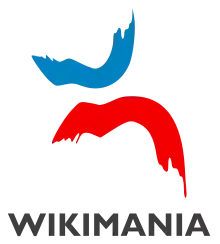Emna Mizouni
Emna Mizouni (Arabic: آمنة الميزوني; born 1987)[1] is a Tunisian online and human rights activist, free-lance journalist, communications expert and business executive. After successfully helping to prepare RightsCon Tunis, in July 2019, Access Now, the international non-profit human rights group intent on an open Internet, announced her appointment to serve in their global board of directors.[2][3] In March 2013, Mizouni co-founded Carthagina, an initiative designed to create interest in Tunisia's cultural heritage at home and abroad.[4][5] In August 2019, at the Wikimedia Conference in Stockholm, she was honoured as Wikimedian of the Year 2019 as a result of the leading role she has played in the development of Arab and African communities as well as her success in promoting the history and culture of Tunisia.[6]
Emna Mizouni | |
|---|---|
 | |
| Born | 1987 (age 33–34) |
| Nationality | Tunisian |
| Occupation | Online and human rights activist, free-lance journalist, communications expert and business executive |
| Known for | On the global board of directors of Access Now |
Early life and education
Raised in Tunisia's capital Tunis, Mizouni matriculated from the Lycée Khaznadar in the Le Bardo district of the city in 2006. She then attended the École supérieure de commerce (ESCT) in Tunis where she first graduated in management (2009) and then went on to earn a master's degree in marketing, business negotiations, and communications (2011). After her studies, she worked in marketing and as a journalist and radio presenter. In June 2012, she was appointed Marketing and Communications Officer for the British Council.[1][7]
Career
In the aftermath of the Arab Spring, Mizouni was struck by the paucity of knowledge regarding Tunisian history and culture. As a result, together with other collaborators, she founded Carthagina (based on Carthage, the ancient name of Tunis) which was designed to promote Tunisia's cultural heritage.[3] Pr Safwan Masri, mentioned in his book Tunisia an Arab Anomaly that while meeting Mizouni, she told him about the "significance after the Jasmine Revolution of Tunisians' consciousness of their varied and Mediterranean history as they chart their futures".[8] In 2017, as head of the project, she explained: "After the revolution, lots of people wondered about the country's identity. Differing presentations of our history and culture showed how little we really knew about our rich cultural heritage." Together with Wikipedia and Wikimedia Commons, she organized photo contests focused on Tunisian heritage sites, succeeding in having participants submit hundreds of photographs in collaboration with Wikimedia's GLAM project. This led to Carthagina's project "MedinaPedia", allowing information about the Tunis Medina sites to be accessed on mobile phones via QR codes.[9][10] Another GLAM project was set up by Mizouni's leadership; the Wikimedian in Residence in the Diocesan Library of Tunis, in partnership with the Library and the Archdiocese of Tunis signed by Tunisia's Archbishop Ilario Antoniazzi and delivered by one of the founding members of Carthagina and Wikimedian Zeineb Takouti. Mizouni also saw Carthagina as an incentive for young people to show an interest in their country in a dynamic way, rather than by just following boring history lessons at school.[11]
Emna Mizouni is also the representative of the Karama women's rights network for Tunisia[12] and, along with Leila Ben-Gacem and Zeineb Takouti, is the founder of the non-profit Digital Citizenship organization which facilitates access to information on digital literacy for marginalized groups.[6] She is also curator of Global Shapers, Tunis, which focuses on social business, citizenship and culture.[13] In June 2020, Mizouni joined the Global Shapers Community's Racial Equity sub-committee.
After successfully helping to prepare RightsCon Tunis, a public announcement was made in July 2019 that she was appointed to serve on the global board of directors of Access Now, the international non-profit human rights group intent on an open Internet.[2] In August 2019, at the Wikimedia Conference in Stockholm, she was honoured as Wikimedian of the Year 2019 as a result of the leading role she has played in the development of Arab and African communities as well as her success in promoting the history and culture of Tunisia.[6]
Katherine Maher, Executive Director of the Wikimedia Foundation, complimented Mizouni on her efforts: "Emna is a tireless advocate and champion for free knowledge. Her work, collaboration, and passion to preserve Tunisia's cultural heritage has opened Tunisia’s culture, people, and history to the rest of the world."[14]
Selected publications
References
- "Emna Mizouni: Marketing, Communication, Relations publiques, Community Managemen" (in French). doyoubuzz.com. Retrieved 27 August 2019.
- "Emna Mizouni". RightsCon 2019. June 2019. Retrieved 26 August 2019.
- "Tunisian activist Emna Mizouni joins Access Now board". Access Now. 26 July 2019. Retrieved 26 August 2019.
- Sghaier, Mohamed Ali. "Des cartes postales pour partager l'amour de la Tunisie à travers le monde" (in French). Tunis Webdo. Retrieved 20 February 2015.
- Pierandrei, Elisa. "I nuovi sogni della medina di Tunisi" (in Italian). eastwest.eu. Retrieved 2 April 2018.
- Erhart, Ed (18 August 2019). "Meet Emna Mizouni, the newly minted 2019 Wikimedian of the Year". Wikimedia Foundation. Retrieved 26 August 2019.
- "Tunisia: British Council Launches Projects, Urges Youth to Take Part in Sociopolitical Debates". allAfinca. 10 March 2014. Retrieved 27 August 2019.
- Safwan M. Masri (5 September 2017). Tunisia: An Arab Anomaly. Columbia University Press. pp. 553–. ISBN 978-0-231-54502-0.
- Blaise, Lilia (18 October 2017). "Quatre projets associatifs qui font bouger la Tunisie" (in French). Middle East Eye. Retrieved 29 August 2019.
- "MedinaPedia: Tous sur les trésors de la Médina de Tunis" (in French). Jamaity. 6 August 2015. Retrieved 29 August 2019.
- Bahri, Farouk (30 March 2016). ""Carthagina": À la recherche du patrimoine perdu" (in French). Réalité. Retrieved 29 August 2019.
- "Concept Note - TFGE side event by Digital Citizenship Org" (PDF). Tunis Gender Forum. April 2019. Retrieved 29 August 2019.
- "Tunis Hub". Global Shapers Community. Retrieved 30 August 2019.
- Harrison, Stephen. "Meet Émna Mizouni, the Wikimedian of the Year". OneZero. Retrieved 31 August 2019.
- "Evaluation de la stratégie de communication d'un nouveau media" (in French). MoreBooks. Retrieved 27 August 2019.
External links
| Wikimedia Commons has media related to Emna Mizouni. |
